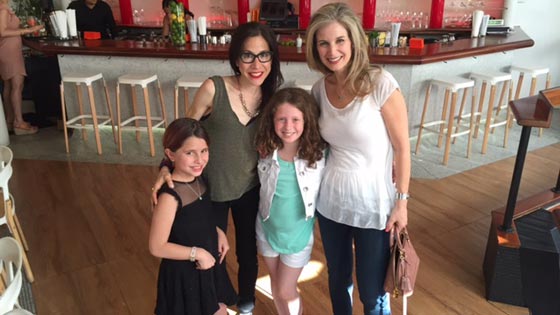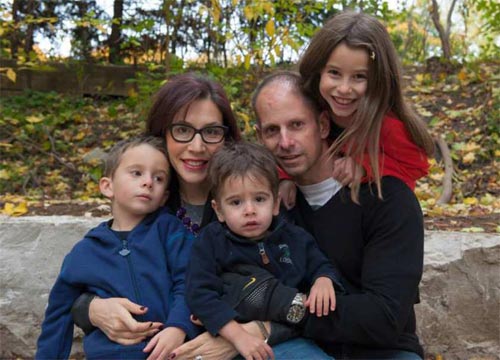
Heidi's Wilk's husband, Matthew Morton, died on Aug. 27, 2015 after a seven-year battle with brain cancer. She reflects on the first year without him and what she envisions for the year ahead. (Photo: UHN)
Aug. 27 was a particularly challenging day for 39-year-old Heidi Wilk, a dietitian at Toronto Rehab.
The date marked the one-year anniversary of the death of her late husband, Matthew Morton, who passed away after a seven-year battle with terminal brain cancer.
UHN News sat down with Heidi to understand the highs and lows of the past year, and interviewed a series of experts to explore the different rituals and traditions people use to commemorate the milestones and anniversaries that come with the death of a loved one.
Related to this story
A year of 'firsts'
After a year of 'firsts' without Matthew – holidays, birthdays, wedding anniversary – one of the most overwhelming tasks Heidi has faced is choosing his headstone and writing the inscription with her two young boys.
In the Jewish tradition, the 'unveiling' of the headstone occurs within the first year after the passing of a loved one. Close friends and family gather at the gravesite to honour the deceased. Matthew's ceremony will take place next month.
"There is something that feels so final about it," says Heidi. "This year has been so busy and focused on taking care of my children that in many ways, I feel like my grief is starting now.
"I miss having that person – my partner in life to make decisions, both big and small. I feel this pressure now more than ever to make sure I'm making the right choices for my kids."
LaVerna Reimer, Social Worker at Toronto Rehab describes the first year of mourning as exceptionally raw.
"The first year is difficult because it's natural to slip into memories of the previous year when the person was still alive – it feels painful to think of moving forward and creating new memories without that person," says LaVerna.
LaVerna reflects on her own experience dealing with the death of her late mother.
Her mother's birthday was in May so the first Mother's Day without her was very painful. That year, LaVerna began sending Mother's Day cards to her two aunts.
"You don't necessarily have to start new rituals, but sometimes you might find a significant way to honour that memory or anniversary," says LaVerna.
"Sometimes replacing something you've lost with something meaningful can offer comfort."

Heidi and her nine-year-old daughter, Brooke, travelled to New York City for a girls’ weekend this summer with Brooke’s best friend, Molly, and Molly's mother, Rebecca. Heidi explains that having small things to look forward helps her stay focused on the future. (Photo: Heidi Wilk)
Good riddance, cancer
While the past year has been the most difficult of Heidi's life, she also describes finding small moments of happiness – and even relief.
When Heidi thinks back to last August, she recalls Matthew at his most vulnerable stage, close to death as he lay in their family home. She had spent the last seven years as her husband's caregiver, her every choice and action forced by cancer's hand.
Dr. Eugene Chang, Physiatrist and Cancer Rehab Specialist at Toronto Rehab and Princess Margaret Cancer Centre's Cancer Survivorship Program, can relate all too well to the complex caregiver and patient relationship.
As a first-year physiatry (rehab medicine) resident and newly engaged to his fiancé, he was diagnosed with myelodysplastic syndrome with acute myeloid leukemia, a cancer affecting the bone marrow.
He remembers not only putting his career in medicine on hold, but having very difficult conversations with his now wife about his prognosis.
"When you receive a cancer diagnosis, you're not alone. Your loved ones feel so much of the pain that you feel and they give all of themselves to support you," says Dr. Chang.
"But even though you're faced with a cancer diagnosis, you still need to continue to live your life – so we had conversations about our future and I always had faith that regardless of what happened, she would be resilient."
Today, Dr. Chang is fit, active and cancer-free. However, his experience has stayed with him and he uses that knowledge in his everyday practice to support caregivers and patients along the cancer journey.
"I played the role of caregiver for so long that I forgot what it was like to have a life of my own," says Heidi.
"Now I'm getting to the stage where I can start to remember the 'healthy' Matthew before he was diagnosed with cancer. I reminisce with my brother, who was Matthew's best friend, and we can look back on our memories in a positive way."
"I think Matthew would be proud of me for that."

Heidi with Matthew and their three children. (Photo: Heidi Wilk)
Year two: Acceptance and healing
Klara Siber-Simic, Registered Psychotherapist and Spiritual Care Practitioner at Toronto Rehab's Bickle Centre for Complex Continuing Care, explains that people who have died continue to be present in our lives through the stories and rituals we have to celebrate them. Many of these traditions are embedded in religious beliefs and cultures around the world.
For example, the "Day of the Dead" in Mexico or "All Saint's Day" (Nov. 1, preceded by All Hallows' Evening, or Halloween,) in the Catholic faith which is dedicated to remembering people who have died.
Related traditions occur in the celebrations of Samhain in pre-Christian or Pagan traditions, which is believed to mark the end of the harvest season and the beginning of winter or the "darker half" of the year.
"All of these traditions demonstrate the human need to remember the people who have died and well beyond the first anniversary," says Klara.
"However, I find that people tend to design their own meaningful rituals to help them remember their loved ones. In Spiritual Care, we are often involved in helping people remember different losses and celebrating how to live with those losses."
For Heidi, Matthew's headstone unveiling will mark a time of reflection and remembrance, but will also signal an opportunity to envision her new life and what moving forward looks like.
For year two, Heidi is focused on self-care, acceptance and healing.
"I'm giving myself permission to have fun again. I'm trying to plan small things to look forward to like celebrating a friend's birthday or a weekend getaway with the kids in Chicago," says Heidi.
"I understand that I need to take care of myself, too. I feel relieved that I've survived the past year and I'm excited to meet the new me."
